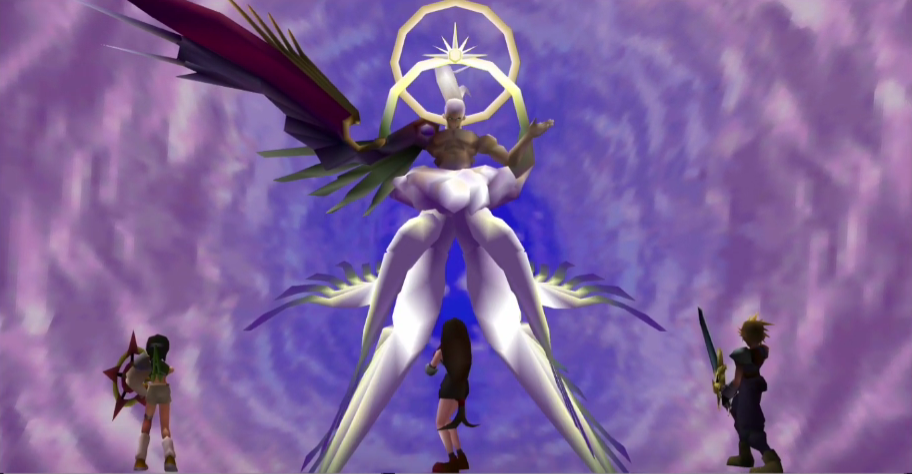Does It Hold Up?: 'Final Fantasy VII' (1997)
The final battle against Sephiroth features an amazing score but also the blocky graphics of 90s 3D gaming.
By JORDAN LIN
If you’ve hung around the gaming community for even a small while, chances are you’ve heard of Final Fantasy VII. Released in 1997 by Square Enix for the original Playstation, the game is held in high regard among JRPG fans to this day. But when a remake came out last year, 23 years after the original, it served as a reminder as to how old the game is. Is this classic still as good as so many make it out to be?
The plot of Final Fantasy VII starts out in Midgar, as our main character Cloud Strife tries to save the futuristic city from the villain group Shinra, who are trying to drain the planet of its life for energy to make money. The game is a real-time, turn-based role-playing game that features full-motion cutscenes — nothing we’re short on today, but at the time of release, it signaled a turning point in the Final Fantasy franchise’s transition from 2D to 3D.
Needless to say, after over two decades, the graphics in the game are fairly outdated. The blockiness of the characters is oddly charming, but maybe that’s just nostalgia speaking, as they look somewhat like Lego characters from our childhood.
When playing any RPG, one of the most important aspects is immersion: the creativity, thought, complexity, and care that is put into the story and world-building, the sense of wonder as you get lost in that world, and the soundtrack that accompanies your travels. Final Fantasy VII still does all that pretty well — to an extent. The gloomy atmosphere in Midgar, along with the eerie music, really reflect the bleak situation of the planet as it is exploited for resources by Shinra. It’s the first of many areas in the game that you can truly really get lost in.
But what could possibly ruin the experience for some, including myself, would be the lack of explanation for some of the game’s most basic mechanics, such as escaping enemy encounters. People like me, who enjoy their blind playthroughs, are never told during gameplay how to run from battles, unless we coincidentally press and hold the right buttons. Chrono Trigger, another classic JRPG which was released in 1995 for the Super Nintendo, made it possible to easily avoid encounters that would otherwise become repetitive.
The slow battle scenes, combined with the run buttons being obscured, makes FF7 frustrating when you’re just trying to explore a vast new area. Compared to modern JRPGs like Monster Hunter Rise or Xenoblade Chronicles: Definitive Edition, where enemies can be fled from or traveled around, Final Fantasy VII’s exploration is tedious. But maybe I’m just too spoiled by modern titles and how they spoon-feed the game mechanics to new players.
The game’s save system can also be unforgiving. You have to save at certain checkpoints spread throughout the world, which isn’t the worst thing. But at times, after finally braving a major fight by an extremely close margin, you could immediately run into another forced battle and die suddenly to a lesser enemy, booting you back to the last time you saved, and resulting in a loss of all progress since then, including the boss fight victory.
While every game has its faults, good soundtracks speak volumes and make a game more memorable. Square really hit the nail on the head with FF7, with bleak music in the slums, tense tunes in enemy headquarters, and the congratulatory melody that plays after every battle, whether it was hard won or a minor accomplishment. And as they should, the developers saved one of the best songs for the final boss fight.
The “One-Winged Angel” packs such a big punch right out of the gate that you know it will be the toughest fight in the game. The beautifully composed score for this battle easily stands besides modern classics like “Hopes and Dreams” or “Megalovania” from Undertale.
Final Fantasy VII Remake, which came out in 2020 for the PS4 and PS5, really shows how much better Square could have done had the original game been developed in the modern era. The remake is just better in every way. With breathtaking graphics and smooth animations, it represents what we have come to love in modern JRPGs. Random encounters aren’t a thing anymore, there’s more active gameplay, you can save wherever you like, and tutorials ease new players into the game.
Without a doubt, Final Fantasy VII has left its mark on gaming history. But after two decades, the original has not aged well as the genre has evolved, and it is now overshadowed in almost every aspect by its successor. All that’s left is a game that is very much overrated, except for the nostalgic value it holds based on childhood memories.
★★☆☆☆

